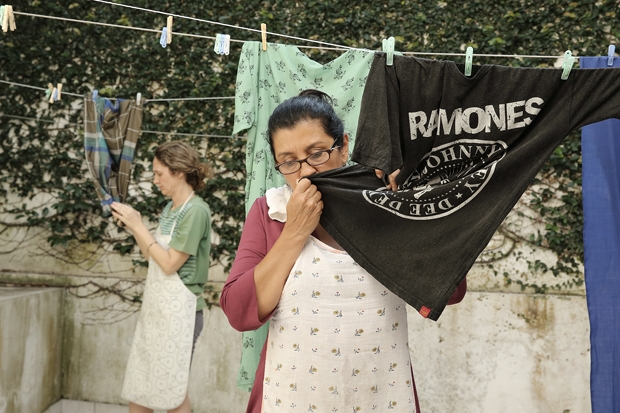The Second Mother is a Brazilian film concerning a wealthy family, their live-in housekeeper, and the arrival of the housekeeper’s daughter, who throws the household into upheaval. If pushed, I’d say it’s about class and the female experience but, before you run for the hills, you should know it is socio-economic warfare beautifully written and it is socioeconomic warfare exquisitely performed and it is socioeconomic warfare undertaken with humour and heart, and if you’re still not sold, more fool you.
The housekeeper — who is also nanny, maid, gardener and dog-walker — is Val, as played by Regine Chase, who is dynamite; who engages in the first frame and then simply carries on doing so. She is a wonderfully warm presence, and has one of those strong-featured, supremely characterful, sublime faces as rarely seen in cinema, now cinema is practically wall-to-wall Jennifer Lawrences. (A face probably not seen since Peggy Mount. Has there been anyone on screen like Peggy Mount? I miss Peggy Mount.)

Val is employed by Barbara (Karine Teles), who is some kind of high-flying professional, and her husband, Carlos (Lourenco Mutarelli), a former painter who is listless and may be depressed, and they have a son, Fabinho (Michel Joelsas). He is around 16, and Val is the second mother, having raised him since he was a little boy, and having been present when Barbara was not. She offers him physical affection to the extent that, even now, when he requires comfort, he climbs into her bed so she can stroke his hair. I must confess that I did find this a little creepy, but maybe they do things differently in São Paulo?
Val does not question her position in life. Val is as happy as Larry. Val dishes up the family’s meals and indulges Fabinho with his favourite ice cream and performs all the chores. Her own sleeping quarters are cramped and minuscule, but she’s fine about that. She has it good, she believes. But then her daughter Jessica (Camila Mardila), who is the same age as Fabinho, comes to stay. Val, we are given to understand, comes from an impoverished rural background, and left Jessica in the care of others while sending money home.
Jessica is self-possessed and smart and questions it all. Jessica is meant to sleep on a mattress on the floor of Val’s cramped and minuscule room but talks herself into the guest bedroom. Jessica thinks nothing of helping herself to Fabinho’s ice cream (chocolate and almond), or jumping into the swimming pool, which Val has told her is absolutely forbidden. Val is horrified. It’s never crossed Val’s mind that her employers are anything other than on the side of right. Val chastises Jessica. You think you are better than everyone else, she says to her, disapprovingly. Jessica denies this is so. I just don’t think I’m worse than anyone else, she says. Both Jessica and Fabinho are trying to get into the same architecture school, and when it becomes apparent who is the stronger candidate, the social fabric begins to tear.

Here, writer-director Anna Muylaert has crafted a compelling tale based around the elaborate dance as always performed between those who serve and those who are served, and more specifically in this instance, women who work for women who work. (I find this relationship so uncomfortable I’ve never been able to have a cleaner, just so you know.) The tension is never explosive, but quietly simmers, as Barbara, who has always thought of herself as kind and decent, feels increasingly threatened, and begins to dissemble; begins more openly to exhibit the disdain that has been there all along. (There’s a terrific early scene when Val gives her a birthday gift she obviously hates.) The narrative grip is strong. We don’t want Val to lose her job. We love Val, who wears every thought on that sublime face, and is capable of ace comic timing, but maybe she’s best off out of there? Maybe her loyalty has to be to Jessica?
There are many themes at play here — outsourced parenting is one — but it is all handled so naturalistically they are never obvious. Everything comes from character, so much so that even the contrivances — and the denouement is especially contrived — don’t jar as they otherwise might. Plus, if you apply the Bechdel Test, which I’m always boring on about, and which so many films fail, this would come up smelling of roses and everything else that is delicious. Obviously, you don’t have to see The Second Mother, but if you let it get away, it will be your loss.






Comments